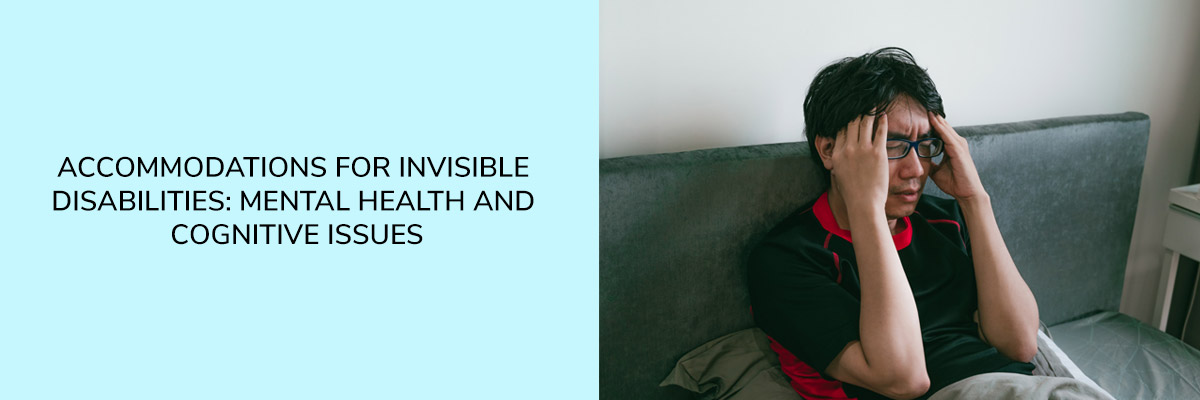Invisible disabilities, particularly mental and cognitive issues, have gained more attention and recognition in recent years. As society becomes increasingly aware of these challenges, it’s crucial that we create an environment that not only facilitates housing but also offers appropriate accommodations for individuals dealing with invisible disabilities.
In the United States, efforts are being made to ensure that individuals with mental and cognitive disabilities have access to comfortable and inclusive living spaces and landlords and property managers arrange reasonable accommodations for them.
This blog post delves into the importance of accommodating these invisible disabilities in US housing and highlights some strategies to create more supportive environments.
Understanding Invisible Disabilities
As the term suggests, these are conditions that aren’t immediately apparent but can significantly impact an individual’s daily life. Mental and cognitive issues are included in this category, which includes various conditions like anxiety disorders, depression, autism spectrum disorders, attention-deficit/hyperactivity disorder (ADHD), and others. These conditions can often be just as, if not more, debilitating as physical disabilities, affecting everything from communication and decision-making to memory and emotional well-being.
The Challenge in Housing
Housing is a fundamental aspect of a person’s quality of life, providing safety, stability, and a sense of belonging. However, traditional housing designs and policies have often overlooked the unique needs of individuals with mental and cognitive disabilities. Many homes have features that can be challenging for people with certain conditions. For example, complex layouts, excessive sensory stimuli, and a lack of quiet spaces can all be difficult for them.
Importance of Accommodations
Accommodating mental and cognitive disabilities in housing is important for ensuring equal access and opportunities for everyone. When individuals have homes that cater to their specific needs, they can experience improved mental health, better overall well-being, and increased social participation. Accommodations can help reduce stressors and triggers, fostering a sense of comfort and safety that is essential for managing these disabilities effectively.
Legal Framework: Fair Housing Act (FHA)
The Fair Housing Act (FHA) is a cornerstone of legislation that protects individuals from discrimination in housing. It includes provisions that require housing providers to make reasonable accommodations for individuals with disabilities, including mental and cognitive issues. Key aspects include:
- Reasonable Accommodations: The FHA mandates that housing providers make reasonable accommodations to rules, policies, practices, or services that may be necessary to allow individuals with disabilities equal opportunity to use and enjoy a dwelling.
- Interactive Process: Housing providers are expected to engage in an interactive process with individuals to determine appropriate accommodations based on their specific needs.
- No Additional Cost: Accommodations should not impose an undue financial or administrative burden on housing providers.
Compliance with fair housing rules is of utmost importance, particularly in cases involving disability, to ensure mistakes are avoided. Make sure to stay updated with the housing compliance laws to avoid penalties and charges.
Strategies for Accommodations
- Flexible Design: Housing designs should prioritize flexibility and simplicity. Open layouts with clear lines of sight can reduce anxiety for individuals who struggle with crowded or complex spaces. Minimalist design principles can help minimize sensory overload. There are a few things that you can keep in mind in the designs of the house that can improve their mental health.
- Sensory Considerations: Many individuals with cognitive and sensory issues are sensitive to stimuli such as noise, light, and textures. Implementing noise-reducing features, adjustable lighting, and soft, calming color palettes can make a significant difference in creating a soothing environment.
- Clear Signage: Clear and consistent signage can aid individuals with cognitive disabilities in navigating their living spaces more effectively. Labels and visual cues can help with memory recall and decision-making.
- Quiet Spaces: Designing quiet retreats within homes, such as a cozy nook or a serene garden, allows individuals to take a break from overstimulating environments.
- Technology Integration: Smart home technology can provide individuals with tools to manage their environment, such as controlling lights, temperature, and security systems with ease.
- Community Engagement: Incorporating communal spaces that encourage interaction can foster a sense of belonging and combat feelings of isolation that often accompany mental and cognitive disabilities.
- Accessibility Standards: Housing construction and renovation should follow accessibility guidelines that take into account the unique needs of individuals with mental and cognitive disabilities. This includes wider doorways, lower countertops, and accessible bathroom features.
- Collaboration: Collaboration between architects, designers, mental health professionals, and disability advocates is crucial to ensure that housing solutions are well-rounded and effective.
Conclusion
As awareness of invisible disabilities grows, so too must our commitment to creating inclusive living spaces. The United States is making strides toward accommodating individuals with mental and cognitive issues in housing, but there is still much work to be done. By adopting innovative design concepts, sensory considerations, and community engagement initiatives, we can contribute to a more compassionate and understanding society where everyone, regardless of their disabilities, has a place to call home—a place where they can thrive and lead fulfilling lives.





